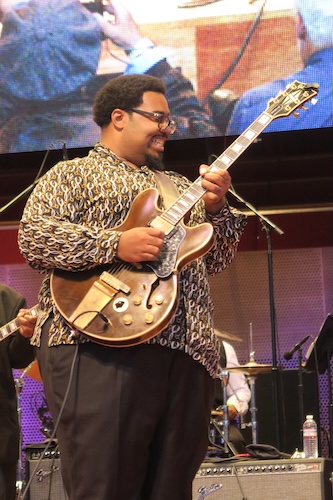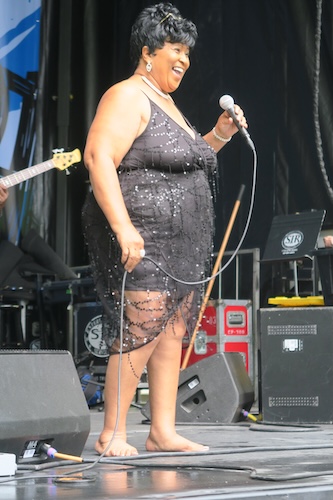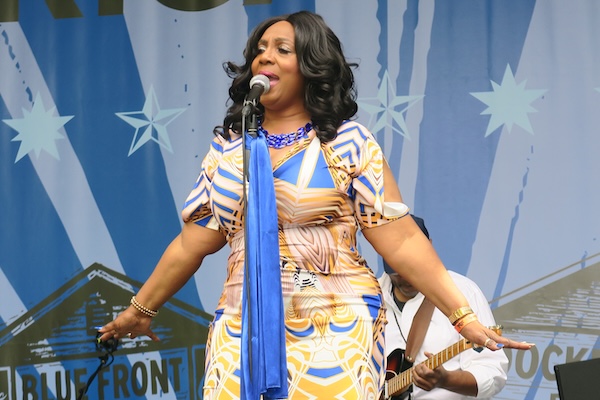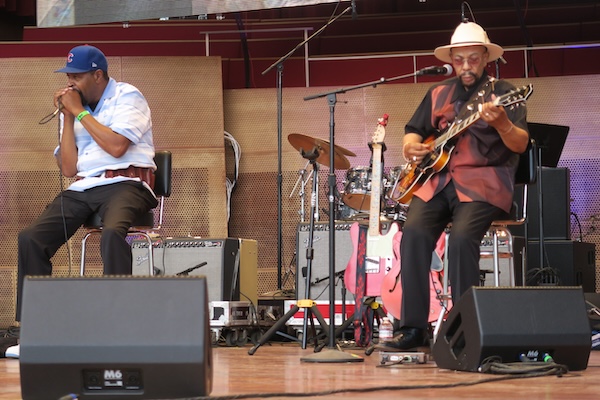Concert Review: The Chicago Blues Festival — A Reassuring Vision of the Future
By Noah Schaffer
This year’s Chicago Blues Festival provided plenty of hope for the blues.

D.K. Harrell at the Chicago Blues Festival. Photo: Christopher Klug
A few years ago, one could have summed up the state of the blues festival scene with the word “attrition.” Regular headliners such as B.B. King and Etta James have passed away, while Buddy Guy is on what he claims is his farewell tour (although it’s already been extended by a year). There will always be a crowd for white blues-rock guitar heroes, but a decade ago, the blues circuit was struggling to find artists who could both fill seats and satisfy the music’s aficionados.
Flash forward to early June’s Chicago Blues Festival, and any doubts about the blues having a future would be cast aside. Mavis Staples, sounding as glorious as ever at 85, was the headliner, but over the course of the weekend no fewer than seven Black artists aged 31 or younger appeared.
Even casual blues fans may by now have heard of 26-year-old Christone “Kingfish” Ingram, who capped off a B.B. King Centennial Tribute set on Friday before he played a full, listener-pleasing set with his own band. Yes, Kingfish veers into funk jams — but he’ll add in a Freddie King lick. And his appreciation for those who created modern blues was on display well beyond his performance at the B.B. King tribute set. After finishing his own show, Kingfish immediately went from the picturesque Millennium Park, where the festival is staged, to the historic Chess Records studio. There, he jammed with 94-year-old bassist Bob Stroger at a benefit for Willie Dixon’s Blues Heaven Foundation, which is located at the site.
But there was another young talent who proved Kingfish is far from a one-off. D.K. Harrell’s clean tone, well-rehearsed horn section, and penchant for lyrical storytelling evoked B.B. King. But he’s more than a tribute act, thanks to songs like “Vibe With Me” and “PTLD,” which reflect the vocabulary of a millennial. (Both are on Harrell’s first record for the storied Alligator Records label, which will be released this month.) Harrell’s band and performance were so perfectly polished that it was shocking to hear him mention from the stage that three years ago he was homeless.
What’s more, Zoomers are discovering the blues. Harrell “Young Rell” Davenport showed his harmonica talents as part of an acoustic trio that also included guitarist Joey J. Saye and multi-instrumentalist Stephen Hull, all of them compelling talents. A highlight was a lively take on Blind Boy Fuller’s “Keep on Truckin’ Mama.” The next day, Davenport played an exciting electric set with a band of Chicago veterans that featured guitarist Billy Flynn, drummer Kenny “Beedy Eyes” Smith, and pianist Johnny Iguana.

Ms. Jody at the Chicago Blues Festival. Photo: Christopher Klug
Although Chicago has lost several blues venues, there are still multiple clubs in the city that welcome the music nightly. One of them, Rosa’s Lounge, curated a tented stage that showcased a wide range of mostly locally based talent. There were plenty of old-timers, such as guitarist Jimmy Burns and a wonderful combo led by three under-sung electric blues lifers: bassist Freddy Dixon (Willie’s son), pianist Maurice John Vaughn, and guitarist John Watkins. The latter was a noted participant in the early ’70s blues world; he is finally resurfacing after years of holding down a day job. But millennial energy was evident in the psychedelia-drenched blues of Michael Damani, as well as in the performances by Jamiah “Dirty Deacon” Rogers and the Dirty Church Band. The loudest band of the weekend, the musicians made Ray Charles and Al Green songs sound like punk and metal anthems.
The festival kicked off in Bridgeport, a neighborhood with a problematic racial history. The area was the location of the Comiskey Park disco riot, but it also contains the beautifully restored Ramova Theater. Longtime harmonica ace Billy Branch tailored his segment for a theater, adding in horns, backup singers, and even a youth gospel choir for the finale. And nonagenarian Bobby Rush’s outrageous revue, complete with his trademark dancers, would thrill audiences in any venue.
Both acts couldn’t have been more excited about finally seeing new blood taking to the music. Rush spoke about the many years in which he struggled to interest young Black musicians and audiences in blues. “A young Black guy would, at best, say ‘That’s my grandfather’s music,’” noted Rush during an on-stage interview. Branch, 73, was quoted by a festival MC as saying he’d waited all his life to see the likes of Kingfish, Young Rell, and Harrell emerge.
There was another trend on display at the festival, and it also had to do with blues music made by contemporary Black artists. It was the continued creative and commercial success of Southern soul music, a sound that continues to be created and performed almost exclusively by and for the Black community. Unsurprisingly, the biggest acts in the genre weren’t in the lineup of a free, municipally financed festival. King George often tops the bills at arenas or large theaters, and 803Fresh appeared during this year’s BET Awards Red Carpet preshow to sing his breakout hit “Boots on the Ground.” 803Fresh has been universally ignored by the mainstream music media, but that hasn’t stopped everyone from Beyoncé to Michelle Obama from championing his song.
The Southern soul acts that did play the Blues Festival tended to be long-running stars of the genre who maintain their own band and can easily fill out a 60- to 75-minute set with their own material. Both Vick Allen and Ms. Jody shined in this format and, in a genre known for ribald material, neither had a problem delivering a clean (if at times inevitably suggestive) set that was acceptable at a family-friendly daytime event. It was clear that both acts satisfied their devoted followers while also picking up a bevy of new fans.
The biggest Southern soul name featured was Latimore, who at 85 is quite selective about where and when he appears. The silver fox, his mane still enviable, displayed ample amounts of both humor and class as he delivered hits like “Straighten It Out” and “My Give a Damn Gave Out.”

Vickie Baker at the Chicago Blues Festival. Photo: Christopher Klug
Southern soul revues can often be overly male-dominated. The Blues Festival went a long way toward addressing this imbalance with such excellent talents as Lady Adrena and LA Band and Vickie Baker, who sang about her “Honey Hole” before revealing that several members of her Groove Crew were her fellow high school music educators. The only disappointment this go-around was Nellie “Tiger” Travis, who will perform Southern soul shows with just a backing track. The excitement of seeing her with a band quickly diminished, once it became clear that she would largely ignore her own Southern soul favorites like “Slap Yo’ Weave Off” in favor of a hoary cover band set list before she finally finished with her smash “Mr. Sexy Man.” Travis fared better when she participated in a multiact tribute to Denise LaSalle, the late Southern soul pioneer who had close ties to Chicago.
Meanwhile, practitioners of classic electric Chicago blues were very much part of the festival. None were better than guitarist John Primer and the explosive harmonica player Steve Bell, who teamed up for both a duo set and with Primer’s Real Deal band. Bell was seemingly everywhere, also playing as part of a Chess Records 75th anniversary tribute as well as with his brother Lurrie in a combo that also included Chicago jazz saxophonist Frank Catalano. (That segment ended up being an hour of fairly standard blues, showing that, despite their shared origins, mixing jazz and blues isn’t as easy as it sounds.)

Steve Bell (left) and John Primer at the Chicago Blues Festival. Photo: Christopher Klug
The most memorable performance of the weekend came from an artist who only sang one song. The Chess tribute was, inevitably, just that: younger artists, which included the descendants of Muddy Waters and Chuck Berry, playing songs in Chess’s famous canon. But then out came Pastor Mitty Collier, who explained that her 1964 Chess hit “I Had a Talk with My Man” had been a secular variation on a James Cleveland gospel composition, “I Had a Talk with God.” Now, the 83-year-old Collier said she was going to keep a spiritual promise she had made after losing her voice (in 1971 she developed polyps on her vocal cords). She would “put that song back to where it was at first.” And Collier did exactly that, with a transcendent vocal performance made even more soulful by a mini-choir from Collier’s More Like Christ Christian Fellowship Ministries.
Noah Schaffer is a Boston-based journalist and the co-author of gospel singer Spencer Taylor Jr.’s autobiography A General Becomes a Legend. He also is a correspondent for the Boston Globe, and spent two decades as a reporter and editor at Massachusetts Lawyers Weekly and Worcester Magazine. He has produced a trio of documentaries for public radio’s Afropop Worldwide, and was the researcher and liner notes writer for Take Us Home – Boston Roots Reggae from 1979 to 1988. He is a two-time Boston Music Award nominee in the music journalism category. In 2022 he co-produced and wrote the liner notes for The Skippy White Story: Boston Soul 1961-1967, which was named one of the top boxed sets of the year by The New York Times.
Tagged: Billy Branch, Bobby Rush, Chicago Blues Festival, D.K. Harrell, John Primer, Lady Adrena and LA Band, Latimore, Mavis Staples, Ms. Jody, Steve Bell, blues
